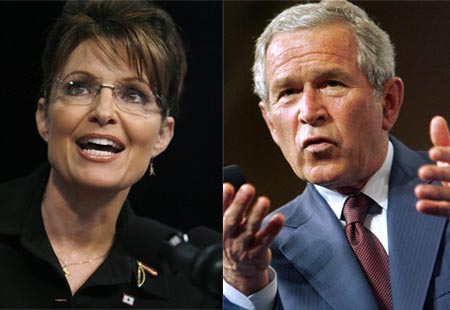Poll shows Tea Party would run big budget deficits and increase the national debt

While Tea Party supporters clamor for limited government and less debt, a recent poll appears to reveal a strong, internal contradiction. Based on the data, Tea Party adherents give high marks to Sarah Palin and George W. Bush, and are reluctant to cut spending in the federal budget's biggest components: Medicare, Medicaid, Social Security, and Defense.
In a CBS/NY Times poll, 91% of Tea Partiers supported a smaller government with fewer services. However, 62% stated that they believed Social Security, Medicare, and Medicaid are worth the cost. But, a pie chart for FY 2009 reveals that these three entitlement programs accounted for a whopping 42% of the federal budget.
Defense spending (DoD and the War on Terror) accounted for a substantial 22% of the federal budget, and anecdotal evidence seems to strongly suggest that the Tea Party (non-Ron Paul faction) has no interest in cutting military spending.
Taken together, entitlement and military expenditures comprise approximately 64% of the federal budget, yet Tea party supporters are hesitant to make any cuts in these critical areas of the budget, despite record deficits.
Surprisingly, their hesitancy is also consistent with three other key statistics.
When asked what they were most angry about, Tea Party supporters ranked government spending behind health care reform and a government that was not properly representing the people. When asked what the primary goal of the Tea Party movement should be, only 45% selected reducing the federal government. And when asked to decide between tax cuts or deficit reduction, 49% favored tax cuts, while 42% favored deficit reduction.
Even more telling, 66% of Tea Party supporters viewed Sarah Palin in a positive light, 57% viewed George W. Bush positively, and a mere 28% viewed Ron Paul favorably. But, these preferences seem to strongly contradict a message of limited government and less debt.
Sarah Palin defended the $700 billion Wall St bailout during the 2008 presidential campaign, and supported John McCain's big spending policies. Palin also strongly supports the current $1 trillion military budget.
And as we all know, George W. Bush and a Republican Congress (for most of his administration) never balanced the budget, added trillions to the national debt, helped devalue the US Dollar by 20%, grew the size of the federal government, and bailed out Wall St.
Ron Paul, on the other hand, rails against unbalanced budgets, federal bailouts, a devalued Dollar, and a growing Federal Government.
And he walks the walk too. Just this year, he returned $100,000 of his Congressional office budget back to the US taxpayers, continuing a long tradition of running budget surpluses and personally returning them to the Treasury.
Taken in their totality, the poll numbers appear to strongly contradict the public message of the Post-Obama, Sarah Palin-led Tea Party movement. While the message is one of fiscal conservatism, the numbers show that much like the Reagan (who had a Republican Senate for most of his administration) and George W. Bush administrations, the Post-Obama Tea Party would cut taxes, run big budget deficits, skyrocket the national debt, weaken the Dollar, and increase the size of the Federal Government.
As a result, critics may have a case when they point out that the current Tea Party movement is more about politics than it is about actual policy.




